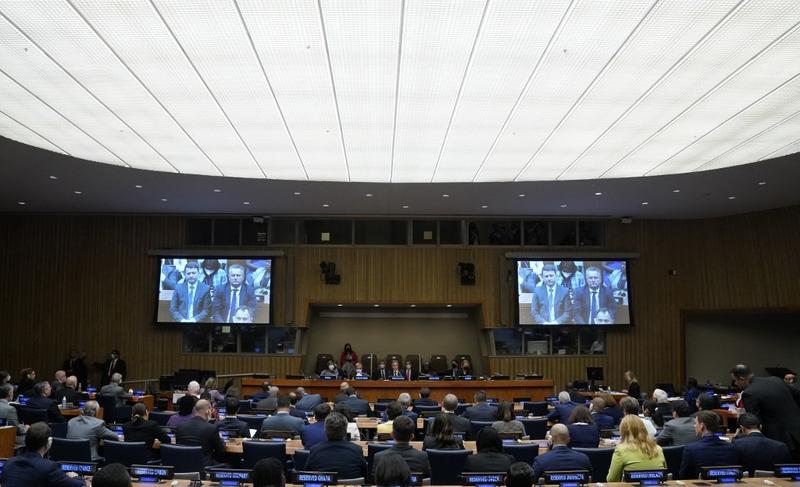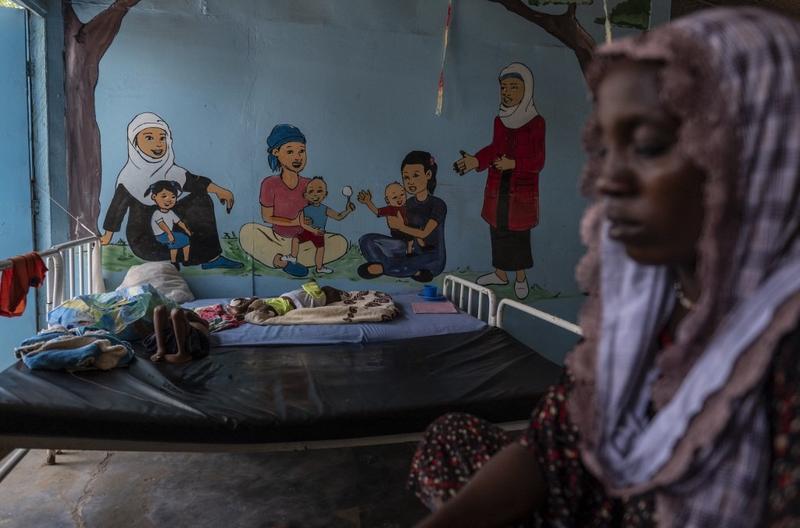 Sergiy Kyslytsya, Ukraine's ambassador to the United Nations is seen on the screen as US Secretary of State Antony Blinken speaks during a "Global Food Security Call to Action" meeting of foreign ministers from approximately 30 countries at the United Nations in New York, May 18, 2022. (TIMOTHY A CLARY / AFP)
Sergiy Kyslytsya, Ukraine's ambassador to the United Nations is seen on the screen as US Secretary of State Antony Blinken speaks during a "Global Food Security Call to Action" meeting of foreign ministers from approximately 30 countries at the United Nations in New York, May 18, 2022. (TIMOTHY A CLARY / AFP)
WASHINGTON – The World Bank and the International Monetary Fund on Wednesday urging the international community to take fast, comprehensive and well-coordinated actions to tackle the ongoing food crisis.
The World Bank pledged up to $30 billion financing in its existing and new projects, as it announced its actions as part of a global response to the crisis.
The financing in areas such as agriculture, nutrition, social protection, water and irrigation will be available for implementation to address food insecurity over the next 15 months. It will include efforts to encourage food and fertilizer production, enhance food systems, facilitate greater trade, and support vulnerable households and producers.
READ MORE: Soaring food, fuel ramp up social unrest risk for emerging markets
The bank is working with countries on the preparation of $12 billion of new projects for the next 15 months to respond to the food security crisis, according to the statement.
Food price increases are having devastating effects on the poorest and most vulnerable.
David Malpass, President, World Bank Group
In addition, its existing portfolio includes undisbursed balances of $18.7 billion in projects with direct links to food and nutrition security issues, covering agriculture and natural resources, nutrition, social protection, and other sectors.
"Food price increases are having devastating effects on the poorest and most vulnerable," said World Bank Group President David Malpass.
To inform and stabilize markets, it is critical that countries make clear statements now of future output increases in response to the Russia-Ukraine conflict, he added.
He urged countries to make concerted efforts to increase the supply of energy and fertilizer, help farmers increase plantings and crop yields, and "remove policies that block exports and imports, divert food to biofuel, or encourage unnecessary storage”.
The IMF meanwhile said the Russia-Ukraine conflict has created "a crisis on top of a crisis" around the globe with countries facing food shortages and sharply higher prices for food, energy and fertilizers.
“These pressures occur at a time when countries' public finances are already stretched from the pandemic and debt burdens are high," IMF Managing Director Kristalina Georgieva said in a statement.
With inflation reaching the highest levels seen in decades, vulnerable households in low- and middle-income countries are most at risk of acute food insecurity, she said, cautioning that hunger often triggers social unrest and violence.
ALSO READ: FAO chief calls on G7 to take steps on food shortages
“If we have learned one lesson from the 2007-08 food crisis, it is that the international community needs to take fast and well-coordinated actions to tackle a food crisis by maintaining open trade, support vulnerable households, ensure sufficient agricultural supply, and address financing pressures,” she said.
 In this May 13, 2022 photo, a mother looks on as two children lie on a bed in the recovery section for of malnourished patients in the Alliance for International Medical Action-managed nutrition unit of the hospital Tchad/ Chine in N'djamena, Chad. The increase in malnutrition cases is seen amid a global price rise of essentials due to the COVID-19 pandemic, the Russia-Ukraine conflict, and less farming output. (ANDREW CABALLERO-REYNOLDS / AFP)
In this May 13, 2022 photo, a mother looks on as two children lie on a bed in the recovery section for of malnourished patients in the Alliance for International Medical Action-managed nutrition unit of the hospital Tchad/ Chine in N'djamena, Chad. The increase in malnutrition cases is seen amid a global price rise of essentials due to the COVID-19 pandemic, the Russia-Ukraine conflict, and less farming output. (ANDREW CABALLERO-REYNOLDS / AFP)
Following a meeting of international financial institutions and global leaders convened by the US Treasury Department on April 19, the IMF, the African Development Bank, Asian Development Bank, European Bank for Reconstruction and Development, Inter-American Development Bank, the World Bank, and the International Fund for Agricultural Development have worked together to formulate a joint action plan to address food security.
According to the newly released plan, the international financial institutions will pursue actions to step up, surge, and scale their work across six priority goals: support vulnerable people; promote open trade; mitigate fertilizer shortages; support food production; invest in climate-resilient agriculture for the future; and coordinate for maximum impact.
READ MORE: Middle East, North Africa grapple with food insecurity
"Working closely with the World Bank and other international financial institutions, the IMF will provide policy advice, capacity development assistance, and financial support to help further catalyze and complement financing from other institutions," Georgieva said.
The IMF chief noted that the IMF will also bring to bear its new Resilience and Sustainability Trust, which will provide affordable longer-term financing for countries facing structural challenges, and intensify efforts with the World Bank and others to support debt restructurings where needed.


